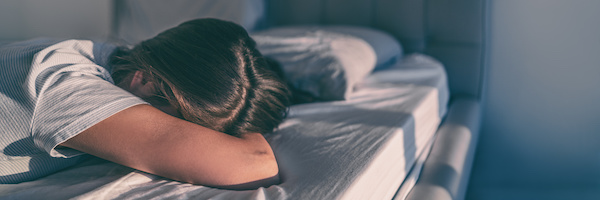Around 20% of Americans are living with mental illness, which can lead to interruptions in sleep and cause daytime sleepiness. Tackling the day can be a challenge when productive sleep isn’t achieved and can result in the creation of a vicious cycle between the two.
The thing is, your mental health and sleep are closely intertwined, which means they have a huge impact on one another.
Let’s dive into how mental health and sleep are related, how they play off of one another, and what to do to take steps forward towards a better night’s sleep.
How Your Mental Health Affects Sleep
For you to drift off to sleep, your mind and body need to be in a relaxed state, free from worries and stress regarding the day before, the following day, or months ahead.
To fall asleep, your sleep-promoting neurons release inhibitory neurotransmitters, which help to calm your mind and prevent you from feeling awake and alert. They also increase the number of sleep-active neurons in your brain.
But, if you’re living with mental health conditions, it can be difficult to “turn your brain off” and get in the state of relaxation needed to fall asleep. For instance, if you’re stressed, you’ll have higher levels of cortisol and adrenaline in your body, which are hormones associated with the fight or flight response.
Mental health conditions such as anxiety can trigger your body’s fight or flight response to fail, which means you will be in a constant state of flight. The flight feeling is associated with your body’s inability to relax, which in turn, means it can’t properly turn on the much-needed sleep-promotion and sleep-active neurons. When you’re in the constant state of fight or flight, your melatonin production—which is the gland in your brain that promotes feelings of sleepiness—is suppressed.
In addition to anxiety disorders, other mental health conditions that trigger similar responses include post-traumatic stress disorder, panic disorder, obsessive-compulsive disorder, hyperactivity disorder, attention deficit hyperactivity disorder (ADHD), and some personality disorders.
Studies show that people with bipolar disorder have a higher level of 3-methoxy-4-hydroxyphenylglycol (MHPG) when in a manic state. MHPG is a metabolite of norepinephrine, which is associated with wakefulness and thus, is the enemy of sleep.
However, for those with schizophrenia, experts aren’t sure if the condition causes sleep disorders or if it’s the other way around, demonstrating the cycle between the two conditions.
How Sleep Disorders Affect Your Mental Health Conditions
On the other hand, sleep affects your mental health as well.
Interruptions to your sleep interfere with your body’s natural ability to rest, repair, and restore itself. Sleep interruptions disturb your REM and non-REM cycles, causing you to wake up feeling frustrated, restless, and exhausted.
In one study, people with symptoms of Obstructive Sleep Apnea (OSA)—such as shortage of breath, gasping, or snorting—were more likely to have depression. OSA can also exacerbate anxiety due to your brain’s release of the panic signal when you are unable to breathe, causing you to wake up to resume breathing and disturbing your sleep cycle.
Above, we discussed how bipolar disorder can prevent you from getting enough sleep during manic phases. But, not getting enough sleep can also, in turn, cause symptoms of mania or hypomania. Studies have shown that for people with bipolar disorder, inadequate sleep patterns preceded manic phases.
For ADHD, it’s the same story. While the condition can certainly have an effect on the quality and quantity of the sleep you receive, it can also be a predictor for ADHD. If you don’t get enough quality sleep, this can also contribute to the symptoms you experience with ADHD.
Lastly, a lack of sleep can also have an effect on your emotional regulation. Without productive sleep, your negative emotions such as irritability, moodiness, or short temper can be exasperated and heightened regarding situations that may not have bothered you when quality sleep was received.
How to End The Vicious Cycle Between Mental Health and Sleep
Breaking the sleeplessness cycle between your mental health and lack of sleep can help to restore both your physical and mental health by leading you on your way to receiving the recommended seven to nine hours of productive sleep a night.
Create a Regular Sleep Schedule
If you sleep at random times throughout the day, this may be contributing to your poor sleep quality and might be worsening your mental health symptoms.
Try creating a regular sleep schedule and repeat it each night to promote quality sleep and increase productivity throughout the day.
Try Cognitive Behavioral Therapy (CBT)
CBT is a therapy technique, used to treat numerous mental health conditions. In addition, CBT is also useful for treating chronic insomnia in those who are experiencing it as a result of mental health conditions or sleeplessness.
Avoid Blue Light Before Bed
Blue light from digital devices—such as your phone or television—can cause interruptions in your sleep cycle. Try putting your phone away a few hours before bedtime to lengthen your REM and non-REM sleep cycles, which will leave your feeling rested in the morning.
Try Light Therapy
Light therapy is where you sit next to a special lightbox for a certain amount of time a day usually in the morning when you first wake up. Studies show that light therapy can be effective in treating sleep disorders and depression and reducing insomnia symptoms.
If you’re experiencing the cycle created from mental health conditions and sleep, you’re not the only one. The two play off of one another. Poor sleep can heighten your mental health conditions and vice versa.
Try our tips to breaking the cycle to take the steps towards your best night’s sleep.





